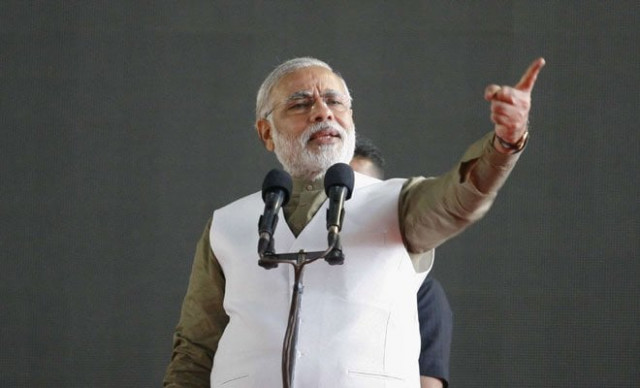In South Asia, water is thicker than blood
Modi is not a difficult enemy to understand, especially since he abandoned artificial hugs & started speaking his mind

Indian Prime Minister Narendar Modi. PHOTO: AFP
Modi is not a difficult enemy to understand, especially since he abandoned artificial hugs and started speaking his mind. When the right-wing leader falls short of pulling out of IWT, he officially and publically gives green light to making the river sharing irrelevant on the ground.
The fate of the Indus Water Treaty
Signed on September 19, 1960, IWT outlines the rights and obligations of Pakistan and India on the use of the Indus waters. The World Bank (WB) mediated between the two nations and also became a signatory but not a guarantor. The pact was sponsored by the UK, Germany, Australia, New Zealand and Canada.
Uncle Sam's tight India embrace
The treaty allocated the use of rivers Sutlej, Beas and Ravi to India while entitled unrestricted use of the western rivers, Indus, Jhelum and Chenab to Pakistan. Legally speaking, India can only interfere with the flow of the western rivers for domestic use, non-consumptive use, such as navigating for flood control and fishing, agricultural use and hydroelectric power generation. Islamabad had only accepted the treaty out of trepidation. Back in the 1990s, the scenario worsened when India started constructing dams without taking Pakistan into confidence.
Pakistan’s top diplomat Sartaj Aziz has rightly stated revoking the treaty would be seen as a declaration of war, but the situation is not unique for Islamabad. On April 1, 1948, Delhi halted the flow of water from the canals on its side. By early May, it had signed the Inter-Dominion Agreement with Pakistan, allowing the continuation of water supplies for irrigation purposes until the newly formed country developed alternative water resources.
Later, Indian Premier Jawaharlal Nehru invited American expert David E Lilienthal to survey the situation. Lilienthal’s determinations favoured Pakistan’s position, thus failed to win Delhi’s support. The matter remained unresolved as the WB sponsored several rounds of talks in Washington from 1952 to 1960.
Why India deferred its limited war plan
India’s plans to build a barrage, Tulbul Navigation Project, on the Jhelum River at the mouth of Wullar Lake, the largest fresh water river, near the town of Sopore in Indian Kashmir alarmed Pakistan in 1984. But Pakistan’s protests resulted in halting the project.
In 1992, India started work on constructing Baglihar Dam on the Chenab River against the spirit of the IWT. Islamabad wasted eight years in fruitless negotiations with Delhi. Due to a multitude of factors, including poor bureaucratic handling and failure to exploit legal ground provided by the IWT, Pakistan failed to halt the reservoir’s construction.
President Asif Ali Zardari during his tenure half-heartedly raised the matter at the UN General Assembly, but without being categorically critical of India’s violation.
Learning from the past
At present, Islamabad has little time to waste pondering over a mere diplomatic engagement with India. The lessons learnt from recent-past include better understanding and invoking for the provisions of the treaty. Pakistan has had the bitter experience of inviting a neutral expert, which is not only time-consuming and costly but is also vulnerable to his legal competence and external influence. The treaty’s dispute resolution clauses are useful when Pakistan has objection on technical parameters of the reservoir.
Modi: The man behind the anti-Pakistan rhetoric
All that the ideologically driven Bharatiya Janata Party leader has to do is approve a few previously completed feasibility studies for hydropower projects, dams and diversions on Chenab, Neelum, Jhelum and their lesser known but vital tributaries, and allocate funds in his eventual aim to run Pakistan dry.
But none of the 12 articles and eight annexes of the IWT provide India the right to construct a certain number of dams. The treaty only provides for technical specifications for building a reservoir. Pakistan’s best option is to launch a diplomatic and political offensive against the construction of dams, which raises environmental and food safety concerns. However, considerable flow has to be guaranteed. The existing yearly data already suggests water inflow has been decreasing vis-a-via the perception received in catchment areas.
Besides a diplomatic offensive, Islamabad will have to seek its right as the lower riparian under the principles of customary international law.
Not only does the resurging water dispute highlight the need for the Ministry of Foreign Affairs to have the finest in-house expertise in international law, it also seeks formation of a panel of legal experts for assessment and remedy of various likely scenarios. Since nothing is straightforward or simple between the neighbours, Modi’s next move may end up fuelling risks of a nuclear war.
Professor Robert G Wirsing, a veteran expert in South Asian affairs, once said in a seminar held in Islamabad, "The solution to water disputes is heavily tied with the fate of Jammu and Kashmir."
Naveed Ahmad is a Pakistani investigative journalist and academic with extensive reporting experience in the Middle East and North Africa. He is based in Doha and Istanbul. He tweets @naveed360


















COMMENTS
Comments are moderated and generally will be posted if they are on-topic and not abusive.
For more information, please see our Comments FAQ